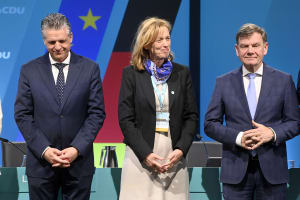Is Russia quickly seeking to fill the void of an American withdrawal from the Middle East?
Military deal with the Saudis and a meeting with the king of Jordan – both this week – show increasing Russian influence in the region

As America gradually withdraws from the region, Russia has been increasing its military presence in the Middle East – especially in Syria and now with a weapons deal with Saudi Arabia.
Russia reportedly wants Jordan and other Sunni Arab nations to normalize ties with the Assad regime and readmit Syria into the Arab League after the pan-Arab organization suspended diplomatic ties with Damascus in 2011.
Hence the significance of Russian President Vladimir Putin hosting Jordan’s King Abdullah II in Moscow this week where they discussed the volatile situation in Afghanistan and Syria.
“Of course, we hope for an exchange of views on the most pressing matters…They are the normalization of the situation in Syria and the current escalation in Afghanistan,” the Russian president said.
By officially courting Jordan, an important U.S. ally in the Arab world, Russia appears to be signaling that it is determined to expand its regional influence in the power vacuum created by Washington’s ongoing exit from the Middle East.
Also this week, Saudi Arabia and Russia signed a military cooperation agreement near Moscow, Saudi Deputy Defense Minister Khalid bin Salman announced on Twitter on Aug. 24.
He said the agreement “aimed at developing joint military cooperation between the two countries.”
Met with Russian Defense Minister Sergey Shoygu to explore ways to strengthen the military and defense cooperation between our two countries. We discussed our common endeavor to preserve stability and security in the region, and reviewed shared challenges facing our countries. pic.twitter.com/T7lVdITZPt
— Khalid bin Salman خالد بن سلمان (@kbsalsaud) August 23, 2021
The Biden administration’s ties with the Saudis have been less warm than with former President Donald Trump's administration. Add to that the recent chaotic and rapid withdrawal by the U.S. military from Afghanistan has sent shockwaves across Washington’s regional allies.
Politically fragile countries like Jordan will therefore likely conclude that strengthening ties with a Russia that is determined to remain in the Middle East, is preferable than putting all eggs into the increasingly unreliable U.S. basket.
Russia is also interested in military cooperation and trade with the United Arab Emirates (UAE), another U.S. ally that signed a normalization agreement with Israel in 2020.
“We, Russia, are ready not only to supply equipment and armaments but also share technologies and arrange local production on the territory of your country, said a Russian defense official with a reference to the UAE.
In the fall 2015, Moscow officially entered the Syrian civil war, offering crucial support to its regional ally, Syrian President Bashar al-Assad against anti-government rebel forces. At the end of 2017, the Russian government declared that its troops would be deployed to Syria permanently. Kremlin’s decision to back the Assad regime is linked to the protection of its military assets in the country, especially the strategically important Russian-controlled naval base in the Syrian city Tartus. This base gives the Russian navy a direct access to the Mediterranean Ocean and beyond without having to first navigate from the Black Sea through politically volatile Turkish waters.
“We will continue ramping up Russia’s navy potential, perfect the basing system and navy infrastructure, fit the most advanced weaponry and equipment on ships, train difficult tasks at drills and in long-distance voyages as well as display the Russian flag in strategically important regions of the world’s oceans,” said Putin.
During former Israeli Prime Minister Benjamin Netanyahu’s tenure, Jerusalem enjoyed close security-coordinated ties with Moscow concerning Syria. Netanyahu and Putin developed a mutually beneficial understanding where Israel did not meddle in Russia’s Middle Eastern affairs while the Kremlin did not interfere in the Jewish state’s military operations against Iranian military targets in Syria.
However lately, Russia is increasingly flexing its muscles in Syria and criticizing Israeli military operations in the country. While the Kremlin could simply be testing Israel’s new Prime Minister Naftali Bennett, it is still too early to conclude whether there has been a strategic shift in Moscow’s Middle East policy that seeks to curb the Israel Air Force’s operational freedom in Syria.
Meanwhile, Russia continues expanding its military cooperation with the Iranian regime, which openly calls for Israel’s destruction.

The All Israel News Staff is a team of journalists in Israel.














